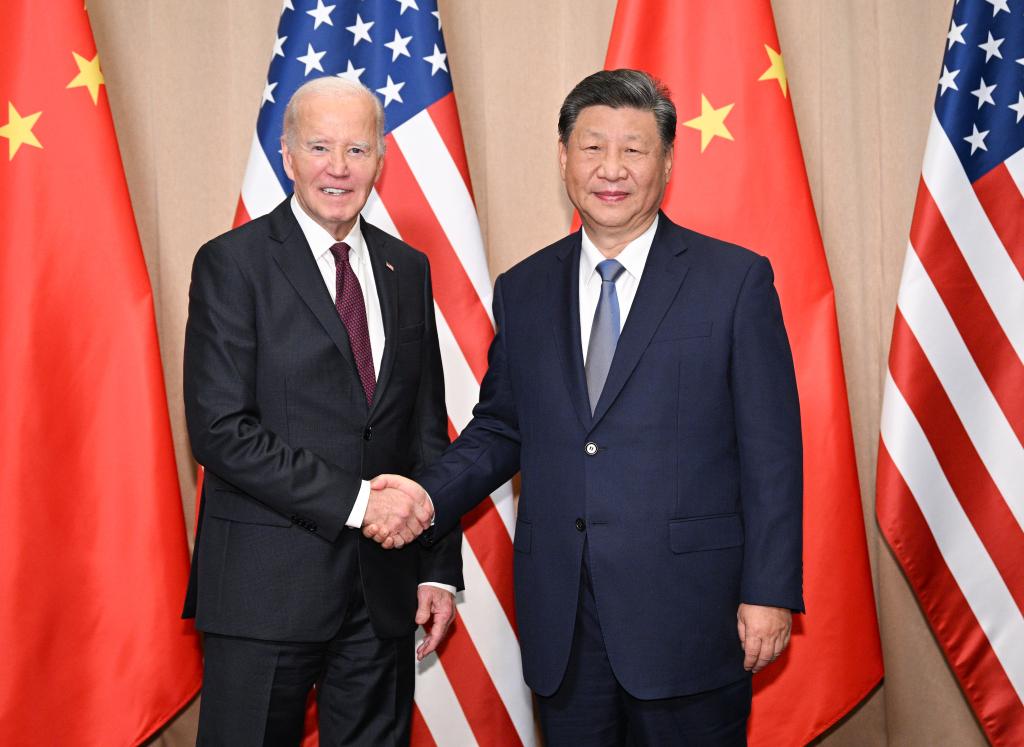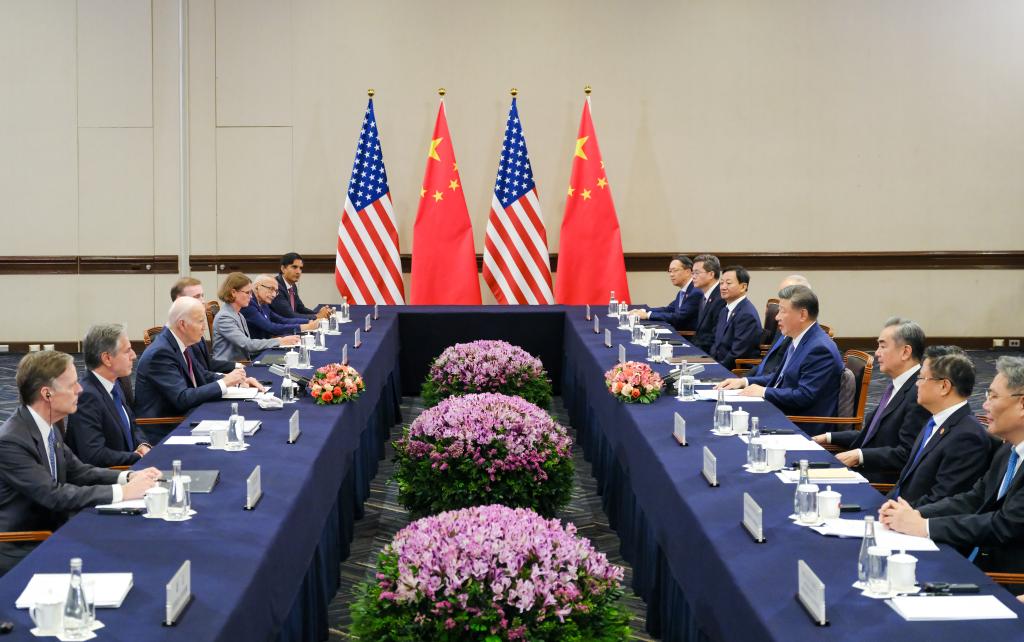


Chinese President Xi Jinping meets with U.S. President Joe Biden in Lima, Peru, Nov. 16, 2024. (Xinhua/Li Xueren)
LIMA, Nov. 16 (Xinhua) -- Chinese President Xi Jinping on Saturday met with U.S. President Joe Biden on the sidelines of the 31st APEC Economic Leaders' Meeting in Lima, Peru.
Xi told Biden that over the past four years, China-U.S. relations have gone through ups and downs, but the two sides have also been engaged in dialogue and cooperation, adding the relationship has remained stable on the whole.
Under the stewardship of the two presidents, the two teams have worked out through consultations a number of guiding principles for China-U.S. relations, and the two presidents have jointly brought China-U.S. dialogue and cooperation back on track, Xi said.
More than 20 communication mechanisms have been restarted or established, and positive achievements have been made in such areas as diplomacy, security, economy, trade, fiscal affairs, finance, military, counternarcotics, law enforcement, agriculture, climate change, and people-to-people exchange, he said.
Xi stressed that it is worthwhile to review the experiences of the past four years and draw inspirations from them. He listed the following:
First, it is important to have a correct strategic perception. The Thucydides Trap is not a historical inevitability. A new Cold War should not be fought and cannot be won. Containing China is unwise, unacceptable and bound to fail.
Second, it is important to match words with actions. A man cannot establish himself without credibility. China has always honored its words. If the U.S. side always says one thing but does another, it will be detrimental to its own image, and undermine trust between China and the United States.
Third, it is important to treat each other as equals. As two major countries, neither China nor the United States should seek to remodel the other according to one's own will, suppress the other from the so-called "position of strength," or deprive the other of the legitimate right to development so as to maintain its leading status.
Fourth, it is important not to challenge red lines and paramount principles. Contradictions and differences between two major countries like China and the United States are unavoidable. But one side should not undermine the core interests of the other, let alone seek conflict or confrontation. The one-China principle and the three China-U.S. joint communiques are the political foundation of China-U.S. relations. They must be observed. The Taiwan question, democracy and human rights, China's path and system, and China's development right are four red lines for China. They must not be challenged. These are the most important guardrails and safety nets for China-U.S. relations.
Fifth, it is important to conduct more dialogue and cooperation. Under the current circumstances, common interests between China and the United States are expanding rather than shrinking. Their cooperation is crucial not only for the economy, trade, agriculture, counternarcotics, law enforcement and public health, but also for handling global challenges of climate change and artificial intelligence (AI) as well as addressing international hotspot issues. The two sides should expand the list of cooperation and make a bigger pie of cooperation to achieve a win-win result.
Sixth, it is important to respond to the expectations of the people. China-U.S. relations should always advance the well-being of the two peoples and bring them closer together. To facilitate personnel and cultural exchange, the two sides need to build bridges and roads, remove distractions and obstacles, and refrain from making any moves that have a chilling effect.
Seventh, it is important to step forward to shoulder the responsibilities of major countries. China and the United States should always keep in mind humanity's future and their responsibilities for world peace, provide public good for the world, and act in a way conducive to global unity, including carrying out constructive interactions, refraining from mutual attrition, and not coercing other countries into taking sides.
Noting that the trajectory of China-U.S. relations has proved the validity of these experiences and inspirations from the past 45 years of diplomatic ties, Xi said when the two countries treat each other as partners and seek common ground while shelving differences, their relationship will make considerable progress.
But if they regard each other as rivals and pursue vicious competition, they will roil the relationship or even set it back, Xi warned.
Noting that humanity is faced with unprecedented challenges in this turbulent world suffering from frequent conflicts, Xi said major-country competition should not be the underlying logic of the times; only solidarity and cooperation can help humanity overcome current difficulties.
He said neither decoupling nor supply-chain disruption is the solution; common development can only be achieved through mutually beneficial cooperation.
He also said "small yard, high fences" is not what a major country should do; only openness and sharing can advance the well-being of humanity.
A stable China-U.S. relationship is critical not only to the interests of the two peoples, but also to the future and destiny of the entire humanity, Xi said, adding China and the United States should keep exploring the right way for two major countries to get along well with each other, realize long-term, peaceful coexistence on this planet, and inject more certainty and positive energy into the world.
Xi stressed that China's goal of a stable, healthy and sustainable China-U.S. relationship remains unchanged; its commitment to mutual respect, peaceful coexistence and win-win cooperation as principles for handling China-U.S. relations remains unchanged; its position of resolutely safeguarding China's sovereignty, security and development interests remains unchanged; and its desire to carry forward the traditional friendship between the Chinese and American peoples remains unchanged.
China is ready to engage in dialogue, expand cooperation, and manage differences with the United States so as to sustain the hard-won momentum toward stability in China-U.S. relations, he said.
Xi also stated China's positions on such issues as Taiwan, economic and trade ties, science and technology, cybersecurity, the South China Sea, the Ukraine crisis, and the Korean Peninsula.
He stressed that cross-Strait peace and stability and "Taiwan independence" separatist activities are as irreconcilable as water and fire. If the U.S. side cares about maintaining peace across the Taiwan Strait, it is crucial that it sees clearly the true nature of Lai Ching-te and the Democratic Progressive Party authorities in seeking "Taiwan independence," handles the Taiwan question with extra prudence, unequivocally opposes "Taiwan independence," and supports China's peaceful reunification, said Xi.
The Chinese people's right to development is not to be deprived of or ignored, Xi noted, saying that while all countries need to safeguard their national security, they should not overstretch the national security concept, still less use it as a pretext for malicious moves to constrain and contain other countries.
There is no evidence that supports the irrational claim of the so-called "cyberattacks from China," said Xi, stressing that China itself is a target of international cyberattacks, and consistently opposes and combats all forms of cyberattacks.
China firmly upholds its territory, sovereignty, and maritime rights and interests in the South China Sea, said Xi. Dialogue and consultation between the states concerned is always the best way to manage differences in the South China Sea, and the United States should not get involved in bilateral disputes over the relevant islands and reefs of Nansha Qundao, nor should it aid or abet the impulsion to make provocations, he added.
Xi stressed that China's position and actions on the Ukraine issue have always been fair and square. China conducts shuttle diplomacy and mediation to promote peace talks, makes every effort for peace, and strives for de-escalation.
China does not allow conflict and turmoil to happen on the Korean Peninsula, he said, noting the country will not sit idly by when its strategic security and core interests are under threat.
For his part, Biden stated that the U.S.-China relationship is the most important bilateral relationship in the world, not just for the two peoples, but also for the future of the world. The two governments have a responsibility to the two peoples and the world to see that competition does not veer into conflict.
In the past four years, the two sides worked together to rebuild or establish channels of communication, as the two diplomatic and security teams have often had strategic communications and candid and in-depth dialogue, which helped the two sides to better understand each other, he said.
Particularly since his meeting with Xi in San Francisco a year ago, the two sides have made tangible progress on mil-to-mil relations, counternarcotics, law enforcement, AI, climate change and people-to-people exchange, said Biden.
The two sides support each other's bid for hosting the APEC and G20 meetings respectively in 2026, demonstrating what we can do for the two peoples when we work together, he said.
The United States does not seek a new Cold War, does not seek to change China's system, does not seek to revitalize its alliances against China, does not support "Taiwan independence," has no intention to have a conflict with China, and does not see its Taiwan policy as a way to compete with China, said Biden, noting that the U.S. side will stay committed to the one-China policy.
The United States is prepared to enhance communication and dialogue with China during the transition period to have a better perception of each other and responsibly manage the differences, said Biden.
The two presidents reiterated the seven-point common understandings on the guiding principles for China-U.S. relations, namely treating each other with respect, finding a way to live alongside each other peacefully, maintaining open lines of communication, preventing conflict, upholding the United Nations Charter, cooperating in areas of shared interest, and responsibly managing competitive aspects of the relationship.
The two sides expressed readiness to uphold these principles, continue to stabilize China-U.S. relations, and ensure a smooth transition of the relationship.
The two heads of state spoke positively about the important role of China-U.S. strategic communication, regular contact between the diplomatic and security teams, and dialogue mechanisms on mil-to-mil relations, economic and trade ties, and financial issues. They agreed to maintain the momentum in communication and strengthen macroeconomic policy coordination.
The two presidents reviewed the important progress in dialogue and cooperation on counternarcotics, climate change, AI, and people-to-people exchanges since their San Francisco meeting.
The two presidents believed that the two sides have had candid and constructive dialogue on AI. The two sides co-sponsored each other's resolutions at the UN General Assembly on AI. They also affirmed the need to enhance international cooperation and promote AI for good and for all. They stressed the need to maintain human control over the decision to use nuclear weapons.
The two heads of state agreed that their meeting had been candid, profound, and constructive, expressing their willingness to stay in contact. ■

Chinese President Xi Jinping meets with U.S. President Joe Biden in Lima, Peru, Nov. 16, 2024. (Xinhua/Ding Lin)
点击右上角![]() 微信好友
微信好友
 朋友圈
朋友圈

请使用浏览器分享功能进行分享
